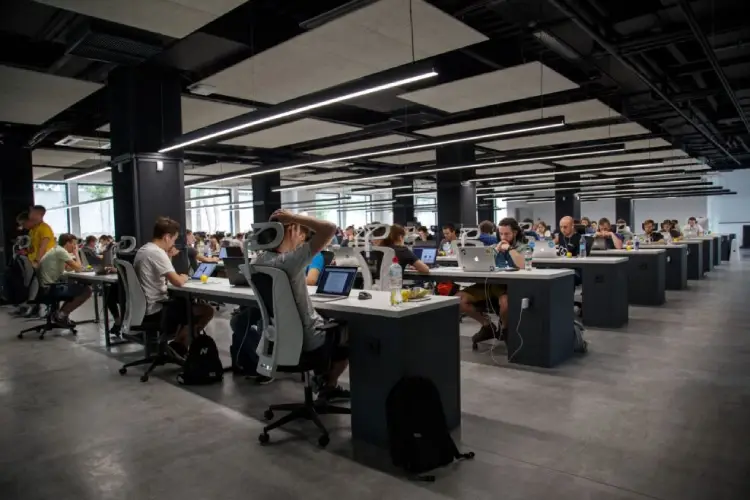
Investment in upskilling staff could boost global GDP by $6.5trn over the next decade, according to recent research from the World Economic Forum (WEF). But cultivating employee adaptability in the workforce will also be vital for business leaders looking to take advantage of future technological shifts.
The WEF study, ‘Upskilling for Shared Prosperity’, says digital transformation and growing globalisation “have led to a pressing societal problem: how to equip people with the skills they need to participate in the economy – now and in the future”. It states “governments, businesses and educational institutions are not currently helping people acquire the skills they need to succeed,” and that a renewed focus around the world on upskilling in the right areas could lead to the creation of 5.3 million new jobs by 2030, boosting global GDP by $6.5trn. The study builds on the findings of an earlier WEF report on the future of jobs, which revealed businesses expect to be reskilling and upskilling more than 70% of workers by 2025, by which time 44% of the skills that employees need will have changed.

But while businesses recognise the need to teach staff to use new digital systems, the pandemic has made clear just how quickly the work environment can change and technology priorities shift.
“Until recently, most companies focused on upgrading skills for near-term advantage – such as improved digital literacy – often in functional areas such as marketing and IT,” consultancy company Mercer wrote in its 2021 global talent trends study. “In the post-Covid-19 world, these are not the highest priorities. Core operations are being overhauled by AI and automation.”
In the wake of the pandemic, organisations are looking for ways to become more flexible, Mercer found: 64% of UK HR leaders it surveyed said reinventing flexibility in their organisation was on their to-do list for 2021.
For this, adaptability is a more valuable capability than any particular technology-specific skillset, says Lynsey Whitmarsh, CXO and director of strategy at training and development company Hemsley Fraser. “[Adaptability] is more about the ability to learn, grow, and change than it is about specific technology,” she says.
Furthermore, the pace of digital transformation is such that teaching individual skills to the entire workforce is too slow. “If you’re going to get cohorts of people to go through learning 15 people at a time, by the time you’ve got to the end of the cohort, or probably even halfway through, the problems will have changed,” she explains.
Ensuring the workforce can adapt to technological changes requires both giving the ability to use new tools and helping them understand how they will impact their working lives, explains Whitmarsh. “If people don’t understand all the technical components or how different things work, there might be a fear of those things, so the behaviour is to reject it.”
Whitmarsh advises that skills training should focus on explaining that training should focus on harnessing the human skills that can’t be automated, such as empathy and collaboration. The WEF study on the future of jobs identifies managing, advising, decision making, reasoning, communicating and interacting as critical human capabilities that can’t be replicated by machines. “It’s about how to humanise the digital experience, and use the digital elements to try and connect people and nudge them into new behaviours,” Whitmarsh adds.
Using technology to support employee adaptability
The increased deployment of digital tools, including those already in place to enable remote working, means businesses are creating a lot of data that can be used to streamline the learning experience and increase employee adaptability, according to Deloitte’s 2021 Tech Trends Report. This data “can help organisations optimise individual and team performance and customise employee experience”.
Blending remote and in-office working with useful technology, like AI-driven personal productivity assistants, could help make personalised recommendations to improve and stimulate personal growth as well as promoting employee adaptability, says the report. Ultimately “as on-site workplaces and headquarters evolve, organisations can use this data to create thriving, productive and cost-effective offices that are seamlessly interwoven with the remote experience,” it says.
[Keep up with Tech Monitor: Subscribe to our weekly newsletter]
Nick Smith, partner in technology strategy and transformation at Deloitte believes this data can be put to good use. “We’ve got people working remotely using collaboration tools rather than working in person, and they almost create this kind of digital exhaust through that remote work that allows better understanding of performance, productivity and morale,” he says. “I think there’ll be lots of considerations about really using that data, particularly as it starts to measure performance productivity.”
The development of productivity tools has been controversial during the pandemic, with Microsoft removing its public productivity score feature from Office 365 after criticism from privacy campaigners. But Smith says such systems can be beneficial if used correctly. “I think there will be many considerations to think about really how much monitoring is done,” he says. “We certainly want to embrace an open and flexible working culture where you’re not tracking exactly what people are doing.”






